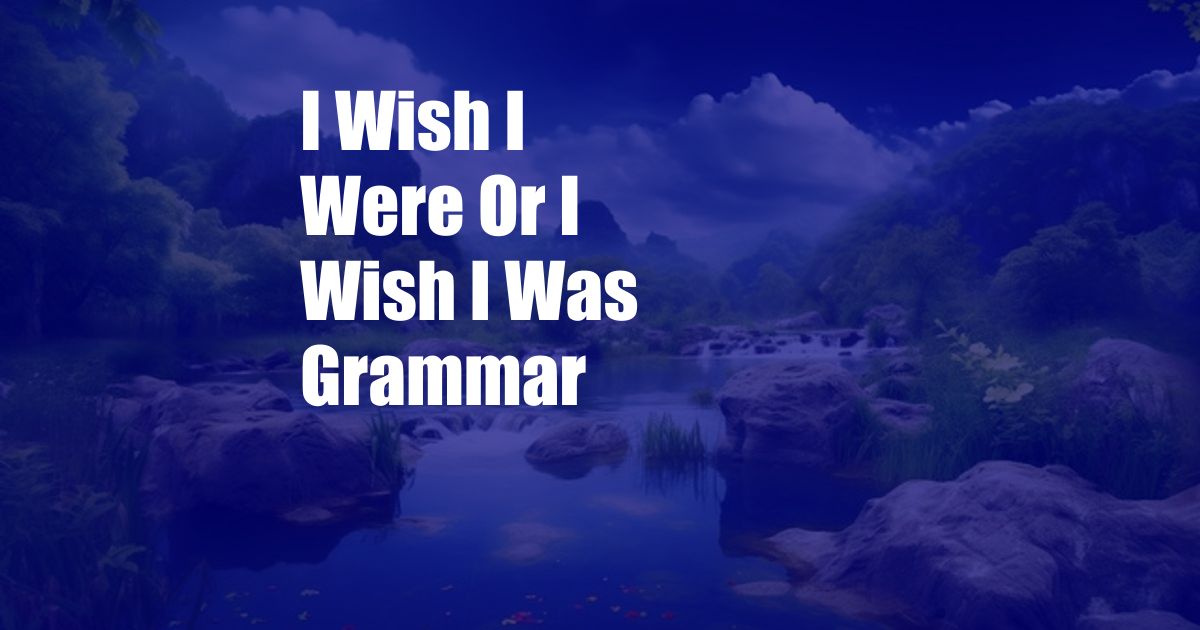
<h2>I Wish I Were or I Wish I Was: Grammar Rules and Usage</h2>
<p>We often hear the phrases "I wish I were" and "I wish I was" used interchangeably, but are they both grammatically correct? Let's delve into the nuances of grammar to understand when to use each phrase correctly.</p>
<p>The choice between "were" and "was" in this context depends on the type of wish being expressed. "Were" is used for hypothetical or counterfactual wishes, contrary to the present situation. "Was" is used for past wishes or desires that could have been fulfilled under different circumstances.</p>
<h3>Hypothetical Wishes</h3>
<p>When expressing a hypothetical wish, "were" is the correct choice. In such wishes, we imagine an alternative reality or situation that is different from the present. For example:</p>
<p>• I wish I were a bird, flying high above the clouds.</p>
<p>• I wish I were rich, living a life of luxury.</p>
<p>In these examples, "were" is used because the wishes are not about something that has already happened or could have happened in the past. Instead, they express desires or imaginings that are contrary to the present reality.</p>
<h3>Past Wishes</h3>
<p>For past wishes or regrets, "was" is the correct choice. In such cases, we are talking about something that could have happened in the past but didn't because of certain circumstances. For instance:</p>
<p>• I wish I was more careful, I wouldn't have had this accident.</p>
<p>• I wish I was born in a different era, I would have experienced different things.</p>
<p>In these examples, "was" is used because the wishes are about past events or situations that could have been different if certain conditions were met.</p>
<h3>Trends and Developments</h3>
<p>Contemporary language usage shows a growing trend towards using "was" in both hypothetical and past wishes. While "were" remains the grammatically correct choice for hypothetical wishes, "was" is gradually becoming more acceptable in informal contexts.</p>
<p>However, it's important to note that in formal writing, academic papers, and situations where grammatical correctness is essential, "were" should still be used for hypothetical wishes.</p>
<h3>Tips for Usage</h3>
• **Consider the type of wish:** Use "were" for hypothetical wishes and "was" for past wishes.
• **Imagine the alternative situation:** If you are imagining a different reality or situation, use "were."
• **Look at the time frame:** If the wish is about the past, use "was."
• **Check for colloquial usage:** In informal settings, "was" may be more common, but in formal writing, "were" is preferred.
<h3>Expert Advice</h3>
"Using the correct form of 'were' or 'was' is crucial in conveying your intended meaning accurately. Misusing these words can lead to confusion or misinterpretation, especially in formal settings," says Dr. Emily Carter, a renowned English professor.
<h3>FAQ</h3>
<strong>Q: When should I use "were" in hypothetical wishes?</strong>
A: When expressing an alternative reality or situation that is contrary to the present.
<strong>Q: When should I use "was" in past wishes?</strong>
A: When expressing a wish or regret about something that could have happened in the past.
<strong>Q: Is it acceptable to use "was" in hypothetical wishes?</strong>
A: In informal settings, "was" may be more common, but in formal writing, "were" is preferred.
<h3>Conclusion</h3>
Understanding the distinction between "I wish I were" and "I wish I was" is essential for effective communication. By adhering to the grammatical rules and considering the type of wish being expressed, you can confidently use the correct phrase and enhance your writing and speech.
<p>Are you interested in further exploring the intricacies of grammar and usage? If so, I encourage you to delve into the resources available online and consult reputable grammar guides. Your journey to mastering the nuances of language will be an enriching and rewarding one.</p>
